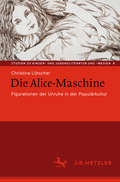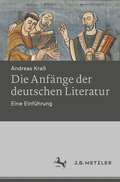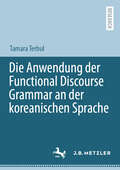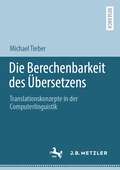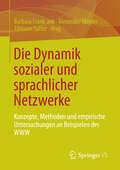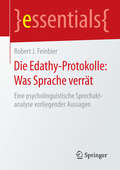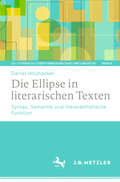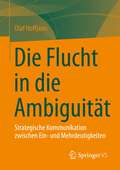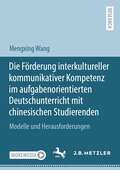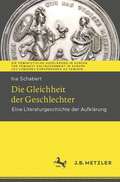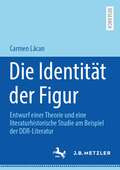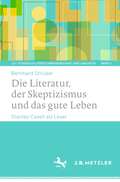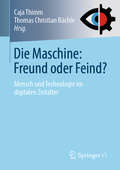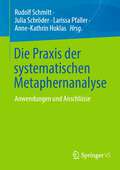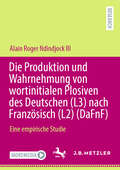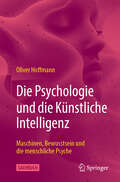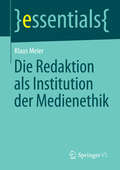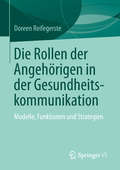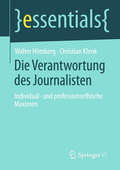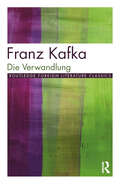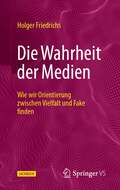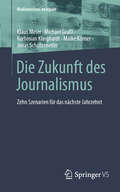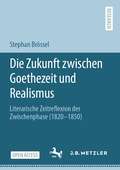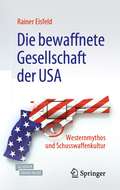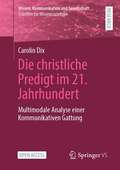- Table View
- List View
Die Alice-Maschine: Figurationen der Unruhe in der Populärkultur (Studien zu Kinder- und Jugendliteratur und -medien #6)
by Christine LötscherLewis Carrolls Alice-Bücher gehören zu den Klassikern der Kinderliteratur. Die Nonsense-Erzählungen wurden immer wieder neu interpretiert und vielfach für Theater, Kino und Fernsehen adaptiert; sie inspirierten Avantgarde-Bewegungen wie Dada und Surrealismus. Denn die Poetik der Alice-Bücher ist voller Widersprüche und Paradoxa, die sich in der Lektüre als ein vibrierender Zustand der Unruhe realisieren. Wenig bekannt ist aber, wie sehr das Zusammenspiel unvereinbarer ästhetischer Figurationen aus Alice in Wonderland ein Eigenleben in der Populärkultur entwickelt hat, das bis heute wirksam ist: als Alice-Maschine. Christine Lötscher macht diese Dynamik in ihren Analysen erstmals sichtbar und zeigt auf, wie die Alice-Maschine das Nicht-Verstehen, das Denken und Fühlen an der Grenze der Sinngebung zwischen Freiheit und Verstörung ästhetisch genießbar macht – besonders in Zeiten gesellschaftlicher und medialer Umbrüche.
Die Anfänge der deutschen Literatur: Eine Einführung
by Andreas KraßDas Buch bietet eine Einführung in die Anfänge der deutschen Dichtkunst in der Zeit vom späten 8. bis zum frühen 10. Jahrhundert. Es präsentiert die zwölf überlieferten poetischen Werke der Epoche in Nachdichtungen, die den ästhetischen Reiz der Vorlagen vermitteln, und in wörtlichen Prosaübersetzungen, die sich am Wortlaut der Originale orientieren (Hildebrandslied, Merseburger Zaubersprüche, Wessobrunner Spruch, Heliand u.a.). Ausführliche Kommentare, Worterläuterungen sowie Gesamtinterpretationen auf aktuellem Forschungsstand erschließen die Texte. Erläutert werden dabei auch der kulturgeschichtliche Kontext, die handschriftliche Überlieferung sowie die Geschichte der Wiederentdeckung dieser frühmittelalterlichen Meisterwerke.
Die Anwendung der Functional Discourse Grammar an der koreanischen Sprache
by Tamara TerbulDie Functional Discourse Grammar (FDG) stellt eine im Jahr 2008 veröffentlichte Grammatiktheorie von Kees Hengeveld und J. Lachlan Mackenzie dar, deren Hypothese anhand von Beispielen aus verschiedenen Sprachen gestützt wird. Auch das Koreanische wird für insgesamt drei Veranschaulichungen der Theorie herangezogen, wodurch eine Anwendbarkeit der FDG an der koreanischen Sprache zwar angedeutet, jedoch nicht bestätigt wird. Bislang gibt es nur eine Monographie, in der es zur vollständigen Anwendung der FDG an einer Einzelsprache kam, nämlich dem Englischen. In dem vorliegenden Buch wird erstmalig die komplette FDG an einer nicht-indogermanischen Sprache, nämlich dem Koreanischen, untersucht. Dabei bilden die vier Ebenen der Grammatiktheorie, die interpersonelle Ebene, die repräsentative Ebene, die morphosyntaktische Ebene und die phonologische Ebene, die Basis. Zu jeder Ebene werden die einzelnen hierarchischen Komponenten vorgestellt und anhand funktionaler und formaler Beispiele ausder koreanischen Sprache näher betrachtet und analysiert. Die verwendeten Beispiele stammen einerseits aus diversen Korpora sowie aus Werken zur koreanischen Grammatik. Die FDG wird als Grammatiktheorie gestützt und ihre Anwendung auch auf nicht-indogermanische Sprachen bestätigt.
Die Berechenbarkeit des Übersetzens: Translationskonzepte in der Computerlinguistik
by Michael TieberDie Entwicklung und Verbreitung von Systemen für maschinelles Übersetzen bewirkt massive Transformationsprozesse in der Sprachdienstleistungsbranche. Die ‚Maschinisierung‘ von Translation führt nicht nur zu Umwälzungen innerhalb des Übersetzungsmarktes, sondern stellt uns auch vor die grundlegende Frage: Was ist ‚Übersetzen‘, wenn eine Maschine menschliche Sprache übersetzt? Diese Arbeit widmet sich diesem Problem aus der Perspektive der Translationswissenschaft und der Techniksoziologie. Im Fokus stehen Translationskonzepte in der Computerlinguistik, die aus einer Wechselwirkung zwischen sozialer Konstruktion und technischen Gegebenheiten resultieren. Der Übersetzungsbegriff von Computerlinguist:innen orientiert sich an der Mechanik der Maschine, wodurch ein Spannungsverhältnis mit den Paradigmen der Humantranslation entsteht.
Die Dynamik sozialer und sprachlicher Netzwerke
by Alexander Mehler Barbara Frank-Job Tilmann SutterIn diesem Band präsentieren Medien- und Informationswissenschaftler, Netzwerkforscher aus Informatik, Texttechnologie und Physik, Soziologen und Linguisten interdisziplinär Aspekte der Erforschung komplexer Mehrebenen-Netzwerke. Im Zentrum ihres Interesses stehen Untersuchungen zum Zusammenhang zwischen sozialen und sprachlichen Netzwerken und ihrer Dynamiken, aufgezeigt an empirischen Beispielen aus dem Bereich des Web 2. 0, aber auch an historischen Dokumentenkorpora sowie an Rezeptions-Netzwerken aus Kunst- und Literaturwissenschaft.
Die Edathy-Protokolle: Eine psycholinguistische Sprechaktanalyse vorliegender Aussagen (essentials)
by Robert J. FeinbierMit den Mitteln einer psycholinguistischen Sprechaktanalyse werden in diesem Essential Aussagefragmente der Zeugen Sebastian Edathy und Michael Hartmann aus dem Bundestagsuntersuchungsausschuss analysiert. Robert J. Feinbier erläutert anhand von Sprechaktbeispielen beider Zeugen, die aus öffentlich zugänglichen Gesprächsprotokollen zitiert werden, wie eine solche Analyse vorgenommen werden kann. Dabei werden Hypothesen über die Persönlichkeit der Zeugen, ihr Aussageverhalten und die inhärente Struktur des Aussageverlaufs entwickelt.
Die Ellipse in literarischen Texten: Syntax, Semantik und literarästhetische Funktion (LiLi: Studien zu Literaturwissenschaft und Linguistik #8)
by Daniel HolzhackerEllipsen stellen eine sprachliche Form dar, die wiederkehrend und mit erkennbaren ästhetischen Funktionen in literarischen Texten vorzufinden ist. Doch um welche Arten von ästhetischen Funktionen handelt es sich dabei genau? Diese Frage steht im Zentrum der vorliegenden Arbeit. Mit einem Ansatz zwischen Linguistik und Literaturwissenschaft geht es darum, zu bestimmen, welche syntaktischen und semantischen Eigenschaften Ellipsen auszeichnen und welche ästhetischen Funktionen ihnen aufbauend auf diesen Eigenschaften in einem literarischen Text zukommen können.
Die Flucht in die Ambiguität: Strategische Kommunikation zwischen Ein- und Mehrdeutigkeiten
by Olaf HoffjannWer stets vage und damit mehrdeutig bleibt, legt sich nicht fest, enttäuscht niemanden, sichert sich damit alle Freiheiten und ermöglicht Veränderungen. Eine solche Mehrdeutigkeit ist in der strategischen Kommunikation allgegenwärtig: Unternehmen, die über ihre gesellschaftliche Verantwortung oder ihre Klimaschutzziele sehr vage reden. Die katholische Kirche, die wortreich und gleichermaßen mehrdeutig über die besondere Relevanz der Frauen spricht. Oder Profi-Fußballvereine, die vieldeutig die besondere Bedeutung ihrer Fans preisen. Diese strategische Ambiguität bzw. Mehrdeutigkeit steht im Mittelpunkt dieses Buches: Wie und warum wird strategische Mehrdeutigkeit in Werbung, PR bzw. der Unternehmenskommunikation eingesetzt? Auf diese Flucht in die Ambiguität fokussiert der Titel des Buches. Da aber Kommunikation kaum gelingen kann, wenn sie immer nur vage, widersprüchlich und damit mehrdeutig wäre, wird der strategischen Ambiguität in diesem Buch stets ihr Pendant gegenübergestellt: die strategische Eindeutigkeit. Eindeutigkeit und Mehrdeutigkeit sind zwei Seiten einer Unterscheidung, mit der Organisationen operieren (können). Dieser konzeptionelle Rahmen wird in dem Buch zunächst eingehend erläutert. Die vielfältigen Praktiken ein- und mehrdeutiger strategischer Kommunikation werden anschließend systematisiert und detailliert beschrieben.
Die Förderung interkultureller kommunikativer Kompetenz im aufgabenorientierten Deutschunterricht mit chinesischen Studierenden: Modelle und Herausforderungen
by Mengxing WangDieses Buch widmet sich dem Thema der Förderung interkultureller kommunikativer Kompetenz von chinesischen Germanistikstudierenden im aufgabenorientierten Deutschunterricht. Diese Arbeit, ein Ergebnis auslandsgermanistischer Feldforschung, gliedert sich in einen theoretischen und einen empirischen Teil. Im Mittelpunkt des theoretischen Teils steht die Herausarbeitung der Merkmale von Lernaufgaben, die im Unterricht die Initiierung interkultureller Lernprozesse ermöglichen sollen. Mithilfe der empirischen Forschung wiederum soll ermittelt werden, inwiefern die interkulturelle kommunikative Kompetenz der Studierenden in drei Dimensionen des Wissens (savoir, savoir faire, savoir être) durch im Unterricht eingesetzte Aufgaben gefördert werden kann.
Die Gleichheit der Geschlechter: Eine Literaturgeschichte der Aufklärung (Die Feministische Aufklärung in Europa | The Feminist Enlightenment in Europe | Les Lumières européennes au féminin)
by Ina SchabertAmazonen der Feder, Bürgerinnen in der Republik des Geistes, weibliche Intellektuelle: die Literatur des 17. und 18. Jahrhunderts war der Ort, an dem Schriftstellerinnen ihre Befähigung zur kulturellen Teilhabe beredt unter Beweis stellten und mal in Auseinandersetzung mit, mal mit Unterstützung von männlichen Kollegen einforderten. Sie entwickelten spezifische Strategien der Autorisierung einer weiblichen Perspektive – Strategien, die über intellektuelle Netzwerke im Europa der Aufklärung zirkulierten. Dabei spielte nicht nur die geistige Emanzipation der Frau aus der patriarchal geforderten Unmündigkeit eine Rolle, sondern auch die sexuelle Selbstbestimmtheit. Dieser Sammelband stellt die weiblichen Beiträge vor allem zur englischen und französischen Literatur des Zeitraums in die sozio-politischen und ideengeschichtlichen Zusammenhänge der Geschlechtergeschichte, und stellt so selbst ein wichtiges Stück feministischer Literaturgeschichtsschreibung dar. Er versammelt erstmals die feministischen Forschungen von Ina Schabert zur Literatur des 17. und 18. Jahrhunderts und macht damit die Schriften einer der einflussreichsten Gender-Forscherinnen in Deutschland in einer neu edierten, kritischen Ausgabe verfügbar.Die Reihe Die Feministische Aufklärung in Europa versammelt Monographien, Sammelbände und Editionen zu der Frage, in welchem Maße und auf welche Weise die unterschiedlichen Strömungen der europäischen Aufklärung zwischen 1650 und 1800 feministische Problemlagen erörterten und Ansprüche einforderten. Wie aufgeklärt war die europäische Aufklärung im Hinblick auf rechtliche, politische, gesellschaftliche, religiöse und kulturelle Egalitätspostulate der Geschlechter, deren Verwirklichung ein ‚Zeitalter der Aufklärung‘ allererst in ein ‚aufgeklärtes Zeitalter‘ transformieren könnten? Die Reihe präsentiert philologische, historische und philosophische Studien sowie mehrsprachige Editionen, die die Vielfalt feministischer Argumente und Positionierungen, aber auch die Bemühungen ihrer Gegner, seit dem späten 17. Jahrhundert dokumentieren.
Die Identität der Figur: Entwurf einer Theorie und eine literaturhistorische Studie am Beispiel der DDR-Literatur
by Carmen LăcanDie Frage nach der Bestimmung der Figurengestaltung wird in zahlreichen Werkinterpretationen in Zusammenhang mit dem Terminus ,Identität‘ gebracht, auch wenn die Figurengestaltung theoretisch sehr unterschiedlich aufgefasst und unter dem Begriff ,Identität‘ eine reiche Palette an Bedeutungen gemeint ist. Wie lässt sich die Figurengestaltung in fiktionalen Texten bestimmen und wie lässt sich die Identität der Figur aus erzähltheoretischer Sicht erfassen? Ein überarbeiteter Figurenbegriff und ein daraus folgendes entwickeltes Beschreibungsmodell werden in der vorliegenden Studie entworfen, um verschiedene Arten der Figurengestaltung zu systematisieren und zu kategorisieren sowie vielfältige Identitätsphänomene aus narratologischer Perspektive für den erzähltheoretischen Diskurs nutzbar zu machen. Der zweite Fokus besteht in der direkten Anwendbarkeit des erarbeiteten Figurenmodells, d. h. in dem Nachweis davon, dass sich die erstellten Kategorien dazu eignen, die Komplexität der narrativen Konstruktion der Figurenidentität und die Vielfältigkeit der Identitätsentwürfe neu zu verdeutlichen, neu zu interpretieren und ggf. auch aus einer literaturhistorischen Perspektive neu zu verorten. Gegenstand sind fiktionale Erzählungen aus einer Literatur, die sich selbst intensiv mit einem besonderen Figurenbild und einer ebenso interessanten Figurenidentitätsproblematik auseinandersetzt, nämlich die oppositionelle Literatur der DDR.
Die Literatur, der Skeptizismus und das gute Leben: Stanley Cavell als Leser (LiLi: Studien zu Literaturwissenschaft und Linguistik #3)
by Bernhard StrickerSkeptizismus – das ist die Konfrontation des Menschen nicht mit der Unzulänglichkeit seines Wissens, sondern mit der Endlichkeit seines Lebens. Mit dieser Neu-Interpretation eines erkenntnistheoretischen Grundproblems hat der amerikanische Denker Stanley Cavell nicht nur der Philosophie, sondern auch der Literatur-, Kultur- und Medienwissenschaft neue Wege gewiesen. Die vorliegende Arbeit erschließt Cavells Werk in seinem systematischen Zusammenhang. Sie legt den Schwerpunkt auf seine Essays zur Literatur und trägt so dem eigentümlichen Begriff Cavells von der Philosophie als einer Praxis der engagierten Lektüre Rechnung. Cavells Arbeiten werden damit als inspirierender Beitrag zu einer Poethik der Lebensform gewürdigt.
Die Maschine: Mensch und Technologie im digitalen Zeitalter
by Caja Thimm Thomas Christian BächleDie Maschine – Freund oder Feind? Selbstverständlich folgt darauf keine eindeutige Antwort, denn in den bekannten Deutungen des Verhältnisses zwischen den Maschinen und den Menschen findet sich immer beides. Spätestens mit der industriellen Revolution ist die Maschine zum Objekt sehr ambivalenter Bewertungen geworden. Sie symbolisiert Fortschritt und Erlösung und gilt doch zugleich als Ursache und Antreiber gesellschaftlicher Konflikte. Eine ähnliche Ambivalenz ist auch heute zu beobachten: Die Angst vor der Maschine ist nicht nur mit Themen wie dem Verschwinden der Arbeit verbunden, sondern mit dystopischen Vorstellungen vom vollständigen Untergang der Menschheit: Künstliche Intelligenz beherrscht menschliches Denken und Handeln, die Manipulationsmacht durch digitale Großkonzerne führt zu einem „Feudalismus 2.0“. Gerade weil die Angst vor den Maschinen und ihren sozialen und politischen Auswirkungen als Topos aus dem größeren Kontext des Mensch-Technik-Verhältnisses bekannt ist, kommt der mit diesem Band verfolgten Aktualisierung dieser Debatte ein wichtiger Stellenwert zu.Der InhaltDie Maschine: Metapher, Mythos, Objekt ● Der Mensch als „Gehirnmaschine“ ● Die schöne neue Cyborg-Welt im japanischen Anime ● Autonome Systeme, Roboter und ethische Implikationen ● Digitaler Feudalismus ● Computer gegen Arbeiter: Digitale Technologien und das Verschwinden der Arbeit ● „Hochinvasive Überwachung“ ● Autonome Waffensysteme und die Imagination menschlicher Kontrolle ● Internetsucht ● Die Digitalisierung menschlicher ReproduktionDie HerausgeberDr. Caja Thimm ist Professorin für Medienwissenschaft und Intermedialität in der Abteilung Medienwissenschaft des Instituts für Sprach-, Medien- und Musikwissenschaft der Universität Bonn.Dr. Thomas Christian Bächle ist Medienwissenschaftler und leitet am Alexander von Humboldt Institut für Internet und Gesellschaft (HIIG) in Berlin das Forschungsprogramm „Die Entwicklung der digitalen Gesellschaft“.
Die Praxis der systematischen Metaphernanalyse: Anwendungen und Anschlüsse
by Rudolf Schmitt Julia Schröder Larissa Pfaller Anne-Kathrin HoklasDas Buch stellt Studien und ihre Ergebnisse vor, die mit der systematischen Metaphernanalyse disziplinenübergreifend gewonnen wurden. Es verknüpft die Metaphernanalyse mit weiteren theoretischen Anschlussmöglichkeiten (u.a. Diskursanalyse, Rahmenanalyse, Wissenssoziologie). Die Anwendungsmöglichkeiten der Methode – auch jenseits einer Analyse von Texten – werden vorgeführt (Bilder, Artefakte, Gesten). Praktische Hinweise zur Durchführung werden gegeben (u.a. Nutzung von qualitativen Softwareprogrammen).
Die Produktion und Wahrnehmung von wortinitialen Plosiven des Deutschen (L3) nach Französisch (L2) (DaFnF): Eine empirische Studie
by Alain Roger Ndindjock IIIDie grundlegende Forschungsfrage in diesem Buch ist, inwieweit Französisch (L2) und andere Faktoren wie L1, Geschlecht, Vokalkontext einen Einfluss auf den Lauterwerb (in diesem Fall von Plosiven) des L3-Deutschen bei Mehrsprachigen haben könnten. Alain Roger Ndindjock III hat insbesondere untersucht, ob es einen Zusammenhang zwischen der Produktion der Voice Onset Time im Deutschen und dem Erfolg bei der Wahrnehmung deutscher Phoneme gibt. Die Ergebnisse zeigen einen signifikanten Erfolg in der Wahrnehmung, jedoch nicht in der Produktion der deutschen Plosive. Dies spiegelt den Einfluss des Faktors Sprachstatus wider. Es konnte kein signifikanter Einfluss der untersuchten Faktoren auf die Aussprache von Lauten in Deutsch (L3) festgestellt werden. Diese Erkenntnisse fließen in ein Integratives Phonologisches Lernmodell (IPLM) ein, das wertvolle Einblicke in die Lauterwerbsprozesse bietet und somit eine effektive Sprachdidaktik in multikulturellen Kontexten fördert.
Die Psychologie und die Künstliche Intelligenz: Maschinen, Bewusstsein und die menschliche Psyche
by Oliver HoffmannIn einer Welt, in der Künstliche Intelligenz (KI) zunehmend in unseren Alltag integriert wird, stellt dieses Buch die entscheidenden psychologischen Fragen: Wie beeinflusst KI unser Denken, unsere Wahrnehmung und unsere Beziehungen? Was macht das Zusammenspiel von Mensch und Maschine mit unserer Psyche? Und können Maschinen jemals menschliche Emotionen, Kreativität oder Moral nachahmen – oder gar übertreffen? Das Buch beleuchtet die psychologischen Mechanismen, die durch die Mensch-Maschine-Interaktion ausgelöst werden, und geht der Frage nach, ob Maschinen ein eigenes Bewusstsein entwickeln können. Es untersucht die potenziellen Risiken und Chancen, die sich ergeben, wenn wir immer mehr Entscheidungen und emotionale Bindungen an KI-Systeme delegieren. Die Kapitel reichen von der Analyse von Maschinenbewusstsein und emotionaler Intelligenz bis hin zur Frage, wie KI unsere Autonomie beeinflusst und ob Maschinen moralische Entscheidungen treffen können. Durch die Verknüpfung von Psychologie, Philosophie und Technologie zeigt das Buch auf, dass KI nicht nur eine technische Revolution darstellt, sondern auch eine fundamentale Herausforderung für unser Selbstverständnis als Menschen. Es lädt die Leser ein, sich den existenziellen und psychologischen Konsequenzen der KI zu stellen und eine kritische Auseinandersetzung mit unserer zukünftigen Rolle in einer Welt zu führen, die zunehmend von intelligenten Maschinen bestimmt wird.
Die Redaktion als Institution der Medienethik (essentials)
by Klaus MeierDie Redaktion ist bislang eine vernachlässigte Institution der Medienethik. Der Band begründet, warum sich dies im digitalen Zeitalter ändert: Weil die journalistische Marke als verlässlicher Informationsgarant in der Flut der digitalen Welt sichtbar sein soll, werben Redaktionen um Vertrauen beim Publikum. Instrumente, die redaktionelles Arbeiten transparent machen und die der Qualitätssicherung dienen, institutionalisieren das Gespräch zu Verantwortung und Qualität in der Redaktion und mit dem Publikum: z. B. Konzepte offener Redaktionen, Ombudsstellen oder qualitätsfördernde Routinen und Strukturen.
Die Rollen der Angehörigen in der Gesundheitskommunikation: Modelle, Funktionen und Strategien
by Doreen ReifegersteIn diesem Buch werden die zentralen Rollen der Angehörigen in der Gesundheitskommunikation aus Modellen der Kommunikationswissenschaft, Psychologie, Soziologie und den Gesundheitswissenschaften abgeleitet. Darauf basierend werden Strategien der Angehörigenkommunikation vorgestellt, die unabhängig von bestimmten Krankheiten und Kommunikationskanälen zum Einsatz kommen. Dies trägt zum Verständnis der potentiellen positiven sowie negativen Wirkungen von Angehörigen in Kommunikationsprozessen bei und dient als Grundlage für die Entwicklung entsprechender Interventionen in der Gesundheitsversorgung.
Die Verantwortung des Journalisten: Individual- und professionsethische Maximen (essentials)
by Walter Hömberg Christian KlenkMedienethische Richtlinien wie der Pressekodex des Deutschen Presserates bieten Journalisten ohne Zweifel eine wichtige Entscheidungshilfe bei ethischen Abwägungen in Fragen von Recherche und Veröffentlichung. Doch Richtlinien, die zwangsläufig allgemein gehalten sein müssen, verwenden dehnbare Begriffe und hinken zuweilen der Entwicklung hinterher. Journalisten sollten sich daher nicht allein auf geschriebene Empfehlungen verlassen, sondern ihr Handeln stets verantwortungsbewusst auf mögliche Folgen hin kritisch hinterfragen. Der Beitrag ruft Journalisten, aber auch Medienunternehmen und Publikum dazu auf, sich ihrer eigenen Verantwortung innerhalb des massenmedialen Kommunikationsprozesses bewusst zu sein und diese wahrzunehmen.
Die Verwandlung: Bilingual Edition German - English - Side By Side Translation - Parallel Text Novel For Advanced Language Learning - Learn German With Stories
by Franz Kafka Peter Hutchinson Michael MindenFranz Kafka is one of the most important figures in twentieth-century culture. The fascination of his work has long since reached international proportions, and the concept 'Kafkaesque' has entered the English Language as an everyday part of speech. This new edition of Kafka's famous story contains a critical introduction and notes which help to explain how the author achieves his particular effects. The editors are concerned less with what the story means then with how it blocks and baffles its reader, provoking them into an interpretation through its combination of clues and counter-clues, its questions and its uncertainties. Careful attention is therefore paid to the 'openness' of the text, to point of view, and to Kafka's use of language. The editors also consider the important biographical and cultural influences which shaped the writing of the story, and they outline some of the very different ways in which it has been interpreted --biographically, socially and psychologically. A select vocabulary, aimed at the demands of the sixth-form pupil, is also included, and the text itself is taken from the original hardback edition.
Die Wahrheit der Medien: Wie wir Orientierung zwischen Vielfalt und Fake finden
by Holger FriedrichsLügenpresse, Fake News, postfaktisches Zeitalter – Begriffe, die aktuell relevanter sind denn je. Obgleich Geschichten so alt sind wie die Menschheit selbst, hat besonders der Begriff des Narrativs vor dem Hintergrund der medialen Berichterstattung einen regelrechten Diskurs ausgelöst. Es gibt viele, die sich lautstark gegen die Medien aufbäumen, aber nur wenige, die die Thematik ganzheitlich betrachten. In diesem Buch nimmt der Autor nicht nur auf realistische Art und Weise die Perspektive der Medien ein, sondern ergreift Partei für sie – mit einer umfassenden Bestandsaufnahme, die unterschiedlichste Disziplinen vereint. Aus Sicht eines studierten Philosophen und Kommunikationsexperten beleuchtet diese Verteidigungsschrift das Zusammenspiel von Narrativen und Emotionen in den Medien und schafft eine solide Basis für alle, die sich realitätsnah mit aktuellen Entwicklungen auseinandersetzen wollen. Lügenpresse ist ein böses Wort, Philosophie und Kommunikationstheorien schwere Kost. Mit Beispielen aus der Praxis und mutigen Überlegungen bildet dieses Buch eine Brücke zwischen Theorie und Praxis, die aufschlussreiche Perspektiven und neue Denkanstöße bereithält. Der Autor scheut sich dabei nicht, klar Stellung zu beziehen – manchmal auch mit einem Augenzwinkern. Ein schwieriges Thema, das leicht zu lesen ist.
Die Zukunft des Journalismus: Zehn Szenarien für das nächste Jahrzehnt (Medienwissen kompakt)
by Klaus Meier Jonas Schützeneder Michael Graßl Korbinian Klinghardt Maike KörnerDer Band beschreibt die aktuellen Entwicklungen des Journalismus in der Mitte der 2020er Jahre und dreht sie plausibel um ein Jahrzehnt weiter. Unser Bild von der Zukunft des Journalismus entsteht aus zehn Trends, die versuchen, der Vielschichtigkeit des Journalismus gerecht zu werden. Es geht uns um die Inhalte und Themen genauso wie um Recherche und Storytelling oder um Rahmenbedingungen wie die Finanzierung. Konstruktiv und publikumsorientiert wird der Journalismus in den nächsten zehn Jahren sein. Er wird nahezu ausschließlich digital genutzt. Dies bringt viele Herausforderungen mit sich.
Die Zukunft zwischen Goethezeit und Realismus: Literarische Zeitreflexion der Zwischenphase (1820–1850)
by Stephan BrösselDieses Open-Access-Buch geht der Zeitreflexion im Feld der Novellistik nach und ergründet Erzählstrategien und -logiken der literarischen Vertextung von ‚Zeit‘, ihre funktionale Einbindung wie auch ihre selbstreflexive und poetologische Gestaltung in Texten. Die Grundlage bildet ein fundiertes, semiotisches Analyseinstrumentarium. Berücksichtigt wird eine breite Textauswahl mit Werken unter anderem von Büchner, Eichendorff, Gutzkow, Hauff, Hebbel, Mundt, Stifter und Tieck.Den historischen Abschnitt zwischen Goethezeit und Realismus kennzeichnet ein Selbstverständnis als Zwischenphase, in der merklich etwas zu Ende geht, ohne dass bereits etwas Neues begonnen hätte. Verankert ist dieser Problemkomplex in einer epocheneigenen Reflexion von Zeit, deren Spezifik in der Verbreiterung des Zukunftshorizontes und dem Auseinanderklaffen von Zukunftsvorstellung und -realisierung liegt. Dabei stellt sich heraus: Die Zukunft als epistemischer Dreh- und Angelpunkt der Zwischenphase ist hochgradig relevant, flexibel und imponderabel. Der Autor:Stephan Brössel forscht und lehrt als Privatdozent und Akademischer Rat a. Z. am Germanistischen Institut der WWU Münster, Abteilung Neuere deutsche Literatur, Schwerpunkt: Literatur und Medien.
Die bewaffnete Gesellschaft der USA: Westernmythos und Schusswaffenkultur
by Rainer EisfeldDas Buch thematisiert den aus der Besiedlungs-, vor allem der Cowboy-Ära hergeleiteten Westernmythos in den USA, der über Generationen hinweg von den populärsten Medien jeder Epoche wiederholt wird. Der bewaffneten Gesellschaft, die das 19. Jahrhundert den Vereinigten Staaten hinterlassen hat und deren (vor allem weiße) Mitglieder sich in beispielloser Weise immer weiter aufrüsten, liefert dieser Mythos fortdauernde Identifikationssymbole und eine Deutung ihrer Ursprünge als Fortschritt durch Anwendung von Gewalt. Seine Prägekraft trägt zur Verhärtung einer Schusswaffenkultur bei, in der sich trügerisches Sicherheitsgefühl und ständige Verunsicherung mischen. Der Mythos befeuert die Sehnsucht nach den „einfachen“ Lösungen einer verklärten Vergangenheit, die Millionen amerikanischer Bürger anfällig macht für autoritäre Demagogie à la Tea Party und Donald Trump. Im Mittelpunkt des Mythos steht die Legende vom Revolverkämpfer als Lichtfigur, die das Buch am Beispiel ihres Prototyps erörtert.
Die christliche Predigt im 21. Jahrhundert: Multimodale Analyse einer Kommunikativen Gattung (Wissen, Kommunikation und Gesellschaft)
by Carolin DixIn diesem Open-Access-Buch wird gezeigt, dass die christliche Predigt eine multimodal realisierte rekonstruktiv-prospektive kommunikative Gattung ist, die die Aufgabe hat, eine Wissens-, Glaubens- und Praktikengemeinschaft herzustellen. Diese Gattung wurde bisher nicht konzise auf allen Gattungsebenen beschrieben. Die vorliegende Arbeit schließt diese Forschungslücke mithilfe natürlicher Audio- und Videodaten. Theoretisch und methodisch bewegt sich die Arbeit an der Schnittstelle zwischen Linguistik und Soziologie. Sie greift sowohl auf das Modell der kommunikativen Gattungen nach Luckmann als auch auf das Repertoire der Multimodalen Interaktionsanalyse zurück. Zusätzlich wird ein neues, innovatives Modell für die Transkription von Multimodalität vorgestellt.
